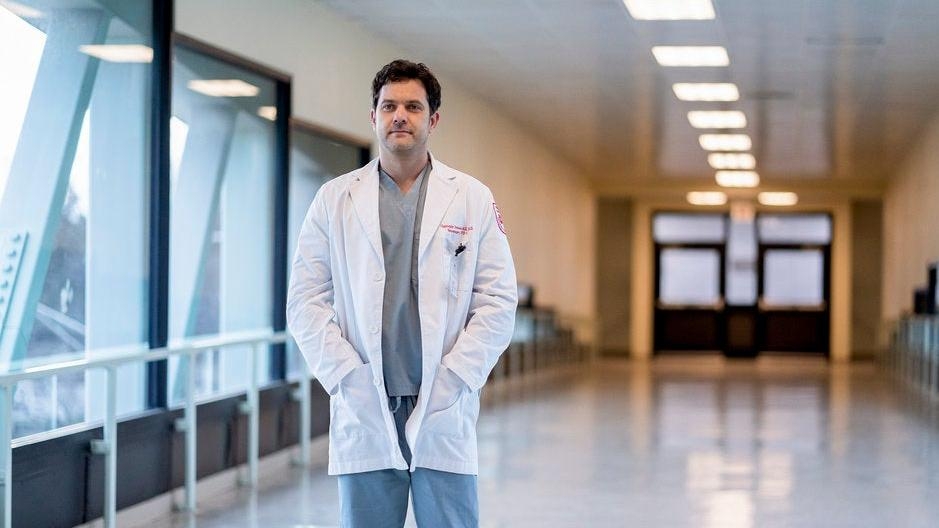Peacock’s Dr. Death breathes new life into a shocking true-crime podcast
The adaptation does no harm, and actually elevates the source material


Peacock’s Dr. Death is the latest of a surprisingly rare breed: a scripted TV series adapted from a popular true-crime podcast. Between the lurid subject matter, meticulous reportage, and preexisting narrative structures, the genre pleads to be transformed into prestige-adjacent eight-episode runs. But to be fair, doing so is risky business. A tin-eared performance or miscalculated tone is all it takes to evoke the most mercenary of Lifetime’s ripped-from-the-headlines factory farm. Riskier still, if a work of narrative non-fiction is impressive enough to warrant an adaptation, it may not gain anything from the effort.
Such was the case with Dirty John, USA’s scripted spin on the Wondery podcast about a mild-mannered interior design mogul and her hasty, horrific relationship with a malignant romance scammer. Dirty John was, at its very best, a competent and respectful staging of a story that had become its best self long before Connie Britton and Eric Bana stepped into the lead roles. That history is what makes Dr. Death, the second scripted series born of a Wondery podcast, a pleasant surprise wrapped in a decidedly unpleasant story. In fact, this adaptation manages to improve on its source material, perhaps because the story of Dr. Christopher Duntsch is so monstrous, it must be seen to be believed.
Joshua Jackson stars as Duntsch, a Dallas-based neurosurgeon who would end up serving a life sentence connected to a roughly three-year surgical rampage during which he maimed or killed dozens of people. In case after disastrous case, patients put their faith in Duntsch, hoping a minimally-invasive spinal procedure will rid them of herniated discs and pinched lumbar nerves. After going under his knife, the vast majority of them wake up to debilitating pain, gouged organs, or total paralysis. That’s if they’re fortunate enough to wake up at all.
Despite the mangled bodies left in his wake, Duntsch packs his schedule with surgeries, flitting to a new hospital each time his operating privileges are quietly revoked at another. The only thing more terrifying than Duntsch’s ruinous persistence is how easily he escapes scrutiny in a professional culture that emphasizes hospital politics and offers boundless deference to split-second judgment calls.
That latitude evaporates when Robert Henderson (Alec Baldwin), a fellow neurosurgeon, is called in to repair one of Duntsch’s procedures and finds evidence of work so shoddy, he initially concludes Duntsch is an unlearned imposter. The truth is far thornier than that once Henderson starts investigating Duntsch’s provenance with help from Randall Kirby (Christian Slater), a vascular surgeon with the misfortune of witnessing Duntsch’s overconfident butchery. Henderson and Kirby are only armed with righteous indignation, but they’re the only ones willing to risk their careers to end Duntsch’s.
If that description sounds more like a show about renegade detectives rather than medical specialists, that’s because showrunner Patrick Macmanus foregrounds Henderson and Kirby’s odd-couple dynamic in the early episodes. Henderson is a humble institutionalist, eager to stop Duntsch but always aware of the feathers he might ruffle in doing so. That leaves Kirby to play the bad cop, delivering his expert opinions in vulgar plainspeak and advocating for the most ostentatious course of action. As much fun as it is watching Baldwin and Slater play off each other, the show is at its most redundant when it feels like a procedural called Dallas Malpractice: Criminal Intent.
Dr. Death comes alive as Duntsch moves from the periphery. Naturally, the show’s success relies heavily on Jackson, whose eternal boyishness has never been wielded to greater effect. Jackson turns in a deft and nuanced performance in a role that spans two decades and requires him to play the show’s protagonist and antagonist simultaneously. The show flashes back to Duntsch’s days as a college football walk-on whose dreams of Heisman glory are dashed by an apparent inability to tell right from left. (This shortcoming persists into Duntsch’s surgical career with predictably gruesome results.)
Duntsch’s character is initially confusing in the pilot, which, like the rest of the series, pogos around the chronology at a merciless pace. It begins as Duntsch is well into his inauspicious surgical career, barking orders at nurses and bristling at any criticism of the improvised technique wrecking his patients’ bodies. Why would such a wide berth be granted to someone so supercilious and reckless? As the fractured narrative connects more of its pieces, Jackson gets to flash more of Duntsch’s superficial charm, his deep insecurities, and his all-consuming desire to impress his withholding parents.
But in spite of its observant lens and Jackson’s able performance, Dr. Death comes just shy of a truly cutting character study. The primary flaw in the series is the same one that plagues the podcast: Duntsch only gets more opaque the more he’s illuminated. It remains unclear which of Duntsch’s maladjustments most contributed to his bad medicine. Could he have avoided his deadly outcomes had he gotten his raging drug addiction under control? Did his actions constitute actual malice, or is his a case of Dunning-Kruger effect taken to an especially macabre conclusion?
Those questions still linger years after the conclusion of Duntsch’s case, which is why Dr. Death is at its most vital when it enters the courtroom phase. The responsibility of teasing out Duntsch’s actual motives falls to Michelle Shughart (AnnaSophia Robb), a young and plucky prosecutor intent on punishing him, despite the rarity of criminally charging physicians for on-the-job tragedies. The most Shughart can do is establish that, to the permanently injured patients, the distinction between evil and incompetence is technical at best.
The real job of convicting Duntsch falls to the all-female directorial team (Maggie Kiley, Jennifer Morrison, and So Yong Kim) and their skillful staging of each botched procedure. There’s unbearable suspense to the surgery sequences, even as the audience can predict the outcomes, and it’s impossible not to wince as Duntsch digs and yanks at his patients’ most sensitive anatomy. Most of the horror is implied through meticulous sound design and reaction shots from the traumatized bystanders. Even with relatively little actual viscera, the tragedy of Duntsch’s rampage stands among the year’s most visceral TV experiences.